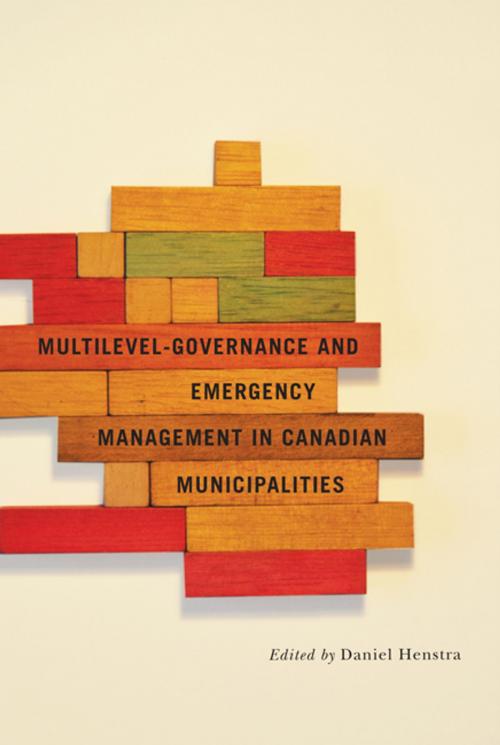Multilevel Governance and Emergency Management in Canadian Municipalities
Nonfiction, Social & Cultural Studies, Political Science, Government, Public Policy| Author: | ISBN: | 9780773589544 | |
| Publisher: | MQUP | Publication: | October 1, 2013 |
| Imprint: | MQUP | Language: | English |
| Author: | |
| ISBN: | 9780773589544 |
| Publisher: | MQUP |
| Publication: | October 1, 2013 |
| Imprint: | MQUP |
| Language: | English |
Whether it is wildfires in Alberta, widespread flooding in Newfoundland, or massive snowstorms in Nova Scotia, Canadian governments must be prepared to manage a range of emergencies. Many organizations and resources have to be coordinated in emergency management, and the quality of emergency planning has a direct impact on the effectiveness of disaster response. Municipalities have primary responsibility, but emergency management requires authority and resources from all levels of government as well as collaboration with stakeholders from the private and voluntary sectors. Drawing on extensive documentary evidence and many interviews with government officials and stakeholders, Multilevel Governance and Emergency Management in Canadian Municipalities provides a comprehensive assessment of the structure and dynamics of emergency management in Canada. Contributors analyze the role of the federal government, compare policies and governance in three different provinces, and examine approaches to emergency planning in thirteen municipalities of varying sizes. In addition to describing political and legal frameworks, essays investigate how emergency management policies are shaped by the relationships between municipal, provincial, and federal officials, as well as with social interests that are concerned about planning for emergencies. Contributors also assess the quality of emergency management. Despite the growing importance of emergency management, there has been little comparative research on Canadian policy making in this field. Multilevel Governance and Emergency Management in Canadian Municipalities provides insights into how governments have readied themselves for emergencies and how they can better prepare. Contributors include Norm Catto (Memorial University), Malcolm Grieve (retired, Acadia University), Geoffrey Hale (University of Lethbridge), Daniel Henstra (University of Waterloo), Luc Juillet (University of Ottawa), Junichiro Koji (PhD, University of Ottawa), Stephen Tomblin (Memorial University), Lori Turnbell (Dalhousie University), and Robert Young (University of Western Ontario).
Whether it is wildfires in Alberta, widespread flooding in Newfoundland, or massive snowstorms in Nova Scotia, Canadian governments must be prepared to manage a range of emergencies. Many organizations and resources have to be coordinated in emergency management, and the quality of emergency planning has a direct impact on the effectiveness of disaster response. Municipalities have primary responsibility, but emergency management requires authority and resources from all levels of government as well as collaboration with stakeholders from the private and voluntary sectors. Drawing on extensive documentary evidence and many interviews with government officials and stakeholders, Multilevel Governance and Emergency Management in Canadian Municipalities provides a comprehensive assessment of the structure and dynamics of emergency management in Canada. Contributors analyze the role of the federal government, compare policies and governance in three different provinces, and examine approaches to emergency planning in thirteen municipalities of varying sizes. In addition to describing political and legal frameworks, essays investigate how emergency management policies are shaped by the relationships between municipal, provincial, and federal officials, as well as with social interests that are concerned about planning for emergencies. Contributors also assess the quality of emergency management. Despite the growing importance of emergency management, there has been little comparative research on Canadian policy making in this field. Multilevel Governance and Emergency Management in Canadian Municipalities provides insights into how governments have readied themselves for emergencies and how they can better prepare. Contributors include Norm Catto (Memorial University), Malcolm Grieve (retired, Acadia University), Geoffrey Hale (University of Lethbridge), Daniel Henstra (University of Waterloo), Luc Juillet (University of Ottawa), Junichiro Koji (PhD, University of Ottawa), Stephen Tomblin (Memorial University), Lori Turnbell (Dalhousie University), and Robert Young (University of Western Ontario).















